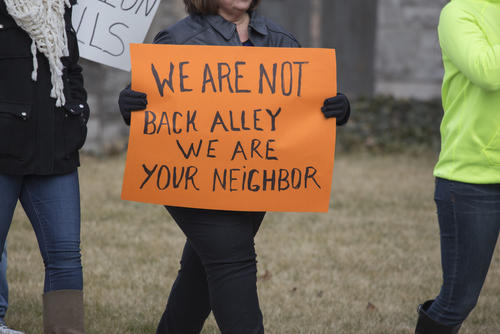The Drug War is a War on All of Us.
The war on drugs has grown to the extent that it impacts not only drug users.
It impacts all of us, including:

Taxpayers – Over a TRILLION dollars has been spent on the War on Drugs and that money has ‘purchased' hundreds of thousands of lost lives, indirect funding of dangerous drug cartels, increase in addiction and drug overdoses, skyrocketing incarceration rates, and significant losses of freedom for citizens – the same people footing the bill! Ending the war on drugs would save the U.S. about $50 billion ANNUALLY in just law enforcement costs. Costs to taxpayers increase even more due to long term effects of incarceration or long term probation for drug offenses. When individuals are treated as criminals and end up with criminal records, many give up and either 'become' the criminals they're perceived to be or become long term liabilities of the State as additions to the welfare roles.

Families – 1/3 of American families are directly impacted by addiction, and all families are indirectly affected. One in 28 children in the U.S. have a parent currently in prison – largely because of the War on Drugs. Parents are compromising retirement funds and losing homes to pay onerous fines and legal fees, attempting to allow family members to receive treatment instead of going to jail or prison. The cascade effect of children growing up without a parent or of families in financial and emotional ruin has an impact on all of us. Parents suffer financially, physically and emotionally, partly due to blaming themselves for their children's issues. Consider this: Has bad parenting really escalated this much over the past decade?

Individuals – Delays in prosecution result in many arrests and jail time for individuals who have turned their lives around and are living productive lives. Lives are ruined and recovery is jeopardized because of criminal justice mandates that give no credit for successes accomplished before prosecution. Mandates for court, drug testing, counseling and subjective requirements of probation compromise careers and overwhelm individuals – who often have pain or other medical issues. Fines, fees, court costs and time off of work can lead to financial ruin for individuals who could otherwise succeed.

Communities – When non-violent drug offenders have criminal records, career opportunities are limited. The War On Drugs has been an unintended recruiting agent for drug cartels, converting low level drug offenders into street dealers, and by extension making the streets unsafe and increasing access to drugs.
Victims of Crime – Nearly four of ten murders, six of ten rapes and nine of ten burglaries go unsolved while the criminal justice system focuses on non-violent low level drug offenders. 90% of those needing treatment don’t get it due to lack of finances and no insurance coverage, making them a higher risk for the commission of crimes than if resources were allocated to treatment rather than incarceration and eventual release with few opportunities.

Police – Police morale is at an all-time low. Suicide now outnumbers line-of-duty deaths. Federal grants and income from asset forfeiture create pressure on officers to focus on drug possession instead of solving violent crime. 85 percent of arrests are for drug possession, while 38 percent of murders, 62 percent of rapes, and 87 percent of burglaries go unsolved. Many dedicated police officers are becoming scapegoats for the frustration and the fear created by the War On Drugs. Some departments have taken it upon themselves to provide treatment in lieu of arrest, essentially decriminalizing drug possession from a practical standpoint.

Businesses – The hysteria of the War on Drugs impacts even small businesses, who now have to worry that their bank accounts will be confiscated as ‘drug money’, regardless of proof. Onerous bank reporting requirements, travel issues and overall security have become significant burdens to business. Hiring employees with criminal records can increase liability for a business. Unfortunately, many gifted employees are bypassed and lose career opportunities because of records for non-violent drug offenses – The same type of offenses that colleagues may laugh about at cocktail parties but didn’t happen to be arrested for. The global economy is greatly impacted by the world-wide illegal drug business. Governmental agencies, businesses and professionals are corrupted by drug money and the power of organizations profiting from the War on Drugs. Having to deal with corruption is never good for legitimate business.

Medical Professionals and Access to Medical Care – Emergency room visits are a very inefficient method of treating ongoing medical issues, yet fear of criminal sanctions and lack of funding for long term treatment creates a disincentive for those struggling with addiction to seek help. This, in turn, escalates medical costs and minimizes access to emergency medical services for the entire population. Criminalization of some drugs restricts options available. Does it make any sense that a physician can prescribe morphine but not marijuana in many states, or that opioids are covered by insurance but cannabis is not? Potential liability or criminal sanctions intrude on the relationship between patients and their medical providers.
Multiple studies have found the addiction rate for patients on prescription medications to be under one percent, yet pain patients are cut off from care, with medications that have worked successfully long term reduced or cut off completely. Suicide rates have increased, and some pain patients have taken dangerous street drugs out of desperation. Any one of us could find ourselves deprived of necessary medications if we needed surgery or developed severe pain issues for any reason.

Addiction Professionals – Trust that’s essential in the counselor-patient relationship is broken when treatment professionals are required to report information from patients to probation officers – who have the legal authority to incarcerate the client. This practice, combined with treatment centers’ growing financial dependence on referrals from criminal justice, is compromising the treatment profession. Even in cases where family members are paying the bill, if criminal charges are pending, privacy is non-existent, and often, probation officers or DA’s dictate the type of treatment and the specific center that will be approved – leaving treatment centers who don’t play well with the criminal justice system at a huge financial disadvantage.
For citations on all facts, see the statistics tab.
